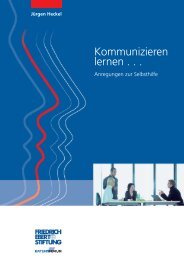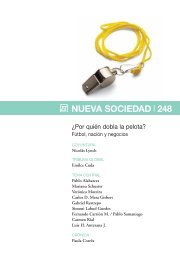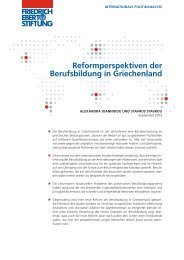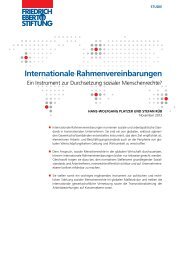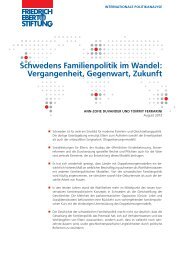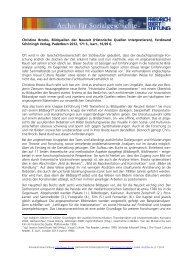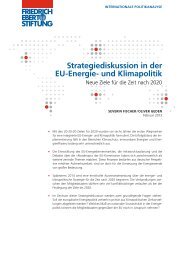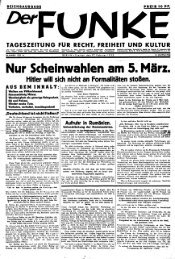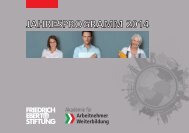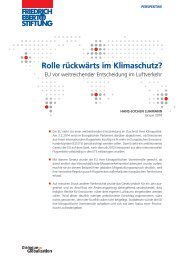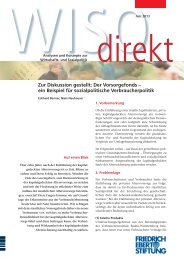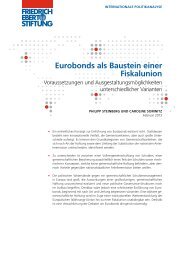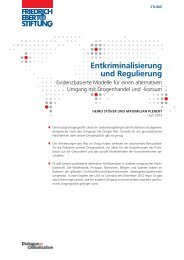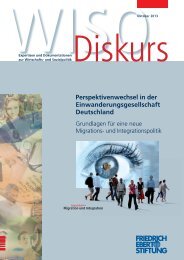Women - men - gender. - Bibliothek der Friedrich-Ebert-Stiftung
Women - men - gender. - Bibliothek der Friedrich-Ebert-Stiftung
Women - men - gender. - Bibliothek der Friedrich-Ebert-Stiftung
Create successful ePaper yourself
Turn your PDF publications into a flip-book with our unique Google optimized e-Paper software.
54<br />
STRUCTURING GLOBALIZATION SOCIALLY<br />
Gen<strong>der</strong> Policy in Asia<br />
FES Gen<strong>der</strong> Equality Project Asia<br />
In Germany, it is said that Valentine’s Day is the<br />
clever invention of the fl orist retail trade and<br />
wo<strong>men</strong> are welcome guests at pubs on a daily basis.<br />
In India, last year, a visit to the pub by a group of<br />
young wo<strong>men</strong> students ended with them being<br />
beaten up by a mob of 40 <strong>men</strong> and being dragged<br />
out of the pub by their hair. The police remained,<br />
by and large, passive. On Valentine’s Day following<br />
this incident, this religious funda<strong>men</strong>talist group<br />
threatened wo<strong>men</strong> with violence, forced marriage<br />
and a beating, if they were to give up their traditional<br />
code and indulge in love or revel in their<br />
sexuality. In the case of India, and in many other<br />
countries of Asia, there are laws for wo<strong>men</strong>’s advance<strong>men</strong>t<br />
and for <strong>gen<strong>der</strong></strong> justice, but these are<br />
rarely imple<strong>men</strong>ted. The old social norms are<br />
stronger. In private and public life, the inherited<br />
norms govern all societal institutions, from the<br />
family to the security forces.<br />
It is already clear that in some Asian countries the<br />
Millennium Develop<strong>men</strong>t Goals (MDGs), seeking,<br />
to provide better opportunities to girls, pregnant<br />
wo<strong>men</strong> and mothers will not be attained. In the<br />
concerned countries, the shortcoming is not discussed<br />
publicly.<br />
<strong>Wo<strong>men</strong></strong>’s Quotas in Parlia<strong>men</strong>ts<br />
The good news is that every year spells progress in<br />
terms of formal equality. The <strong>gen<strong>der</strong></strong> indicators of<br />
the Human Develop<strong>men</strong>t Report 2008 show that<br />
especially in South Asia, the formal option for<br />
political participation of wo<strong>men</strong> is evolving positively,<br />
especially in Sri Lanka and Pakistan, because<br />
national quotas for wo<strong>men</strong> have been introduced<br />
in parlia<strong>men</strong>t. In daily life, however, patriarchal<br />
power relations continue to be fi rmly entrenched.<br />
And it remains to be seen if the current instable<br />
political situations, do not jeopardize the current<br />
quota regulations. Nevertheless, the wo<strong>men</strong>’s quotas<br />
in national parlia<strong>men</strong>ts in South and South-<br />
East Asia create a better starting point for committed<br />
wo<strong>men</strong>. They are a long way off still from<br />
guaranteeing comprehensive, equitable and high<br />
quality policies for wo<strong>men</strong> and families, but they<br />
certainly enlarge the political sphere of infl uence<br />
for wo<strong>men</strong>.<br />
In many Asian political parties, it is not the best<br />
idea, which emerges after lengthy internal debates<br />
and is then accepted, rather it is nepotism, hierarchies<br />
rooted in age and sex, illegal party fi nancing,<br />
or the infl uence of established clans or families<br />
that dominates. There is a lack of wo<strong>men</strong> politicians,<br />
who represent all classes. This is where the<br />
<strong>Friedrich</strong> <strong>Ebert</strong> <strong>Stiftung</strong> steps in with its activities.<br />
An important platform for developing new ideas<br />
on <strong>gen<strong>der</strong></strong> and wo<strong>men</strong>’s advance<strong>men</strong>t and for discussing<br />
these with political decision-makers is the<br />
regional “FES Gen<strong>der</strong> Equality Project Asia”. The<br />
aim is to develop a <strong>gen<strong>der</strong></strong> sensitive consultancy<br />
module through cooperation between the FES and<br />
partner organizations.<br />
Here, the FES is pursuing a dual strategy: on the<br />
one hand, the project is pursuing target group oriented<br />
wo<strong>men</strong>’s advance<strong>men</strong>t programmes and so<br />
supports for example the demands of wo<strong>men</strong> trade<br />
unionists, or initiates an exchange of best practices<br />
on <strong>gen<strong>der</strong></strong> specifi c challenges facing the lea<strong>der</strong>ship<br />
within political parties. On the other hand, the<br />
project compiles knowledge for <strong>gen<strong>der</strong></strong>-sensitive<br />
FRIEDRICH-EBERT-STIFTUNG



